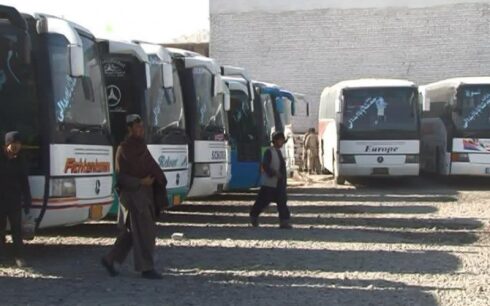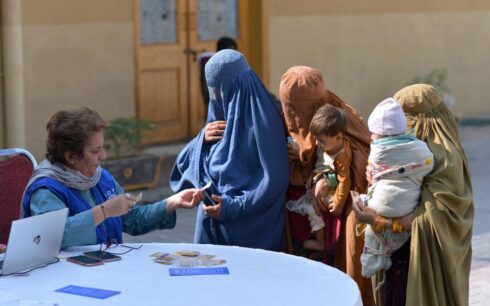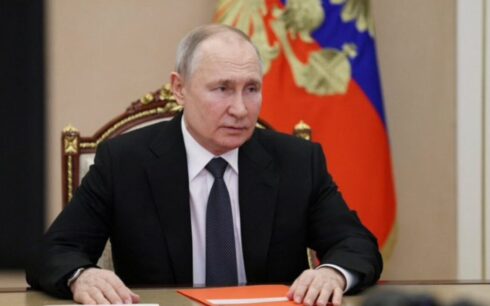A senior expert on Afghanistan affairs at the United States Institute of Peace (USIP) warned this week that aid to the country is likely to drop more sharply in response to the Taliban’s actions against women and girls.
Commenting on the current situation in Afghanistan, Dr William Byrd wrote the “Taliban have made several missteps” in the past year and while the consequences of these are not a threat to their power in the short term, these will damage their ability to govern and potentially damage their “longer-term cohesion”.
He stated that “these missteps will harm the Afghan people much more, both directly and through their adverse impact on humanitarian aid.”
One of these “missteps” was the restrictive decrees issued against women and girls. Byrd pointed out that with the exception of blanket condemnations to Taliban decrees against women and girls, and diplomatic consensus on non-recognition of the Taliban regime, “the international response has been reactive and disjointed.”
The Taliban’s bans on female education and Afghan women working in nongovernmental organizations (NGOs) and the United Nations are causing immediate suffering for immense numbers of Afghans, and if maintained over time will be extremely damaging to Afghanistan’s longer-term economic and social development, he stated.
Byrd also pointed out the importance of female labor force participation for growth and development adding that countries cannot rise from deep poverty and low per capita incomes to higher-income status without it.
“Worldwide experience also demonstrates that girls’ secondary education is key for improving a country’s health outcomes,” he said.
Noting that the Taliban bans have inflicted harm on their regime in that the girls’ secondary education ban exposed fissures within the Taliban. “While there is no sign that the bans will threaten the Taliban’s overall cohesion and power, they undermine the regime’s projection of a picture of complete unity to the outside world and to Afghan society. If in other respects the Taliban’s image erodes and gets tarnished over time, for example by worsening corruption, the combined effect could become more serious,” he said.
The bans will also harm the Taliban government by reducing humanitarian aid and donors’ enthusiasm and ability to keep up a high level of humanitarian support (around $3 billion last year) is eroding fast, spurred by the bans.
He said while the Taliban professes not to care about humanitarian aid and will put the blame for a sharp drop in assistance on the international community, such a decline will hurt their regime in several ways.
“First, as rulers of the country, the Taliban cannot escape some responsibility for economic deterioration and worsening poverty, deprivation and hunger, which will create headaches for the regime.
“Second, lower aid will mean a reduction in U.N. cash shipments to Afghanistan (averaging $40 million per week in 2022). These inflows helped stabilize the economy, shoring up the exchange rate and controlling inflation. Loss of this money will complicate the Taliban’s task of macroeconomic management.
“Third, humanitarian aid inevitably brings some concrete benefits to the Taliban and associated interests. These range from at least partial ability to direct the distribution of food aid and other relief goods to favored beneficiaries (who, even if deserving, get to the front of the line), to getting paid for providing security for U.N. traveling missions, to patronage (employment opportunities) and potentially corruption. A drop in aid will correspondingly reduce these benefits,” Byrd said.
Economic Missteps
Meanwhile, he said the Taliban’s economic missteps have not garnered as much public attention despite being damaging.
Byrd said the most striking was the ban on opium and drug, which the Taliban is implementing. He said these bans and opium poppy eradication decrees actually “go against the regime’s economic interests and may to some extent undermine its cohesion.”
He noted that widespread dissatisfaction over the ban on drugs was evident, adding that the crackdown will inevitably give rise to corruption. “And the opium ban will further damage the already weak Afghan economy, reducing rural incomes by as much as hundreds of millions of dollars yearly.”
While phasing out the drug economy over the long term was necessary, the actual ban lacked any development strategy, he said.
On taxes, he said in the first year, the Taliban regime exploited the budget systems and taxes of the previous government, performing better in key areas like raising revenue. However, budget practices may be weakening under pressure from the leader Hibatullah Akhundzada and his circle.
“Beyond continuing high spending on the security sector …there has been very high spending in the emir (Akhundzada) and prime minister’s offices and of funds allocated for unforeseen contingencies,” Byrd said.
“There are, reportedly, examples of the leadership bypassing budget procedures and directing the Ministry of Finance to give funds directly to designated persons, sometimes in cash,” he added.
According to some reports, such interference led to complaints by then acting finance minister Mullah Hidayatullah Badri, who the leader later shifted to the lower-ranking position of governor of the central bank.
He noted that during the first Taliban regime in the 1990s there was little money in government coffers and “then Taliban leader Mullah Omar reputedly made cash payments himself.”
Byrd also said that the modest degree of macroeconomic stability seen during the past year may not be sustainable.
He also stated that the Taliban’s aggressive revenue collection efforts risk dampening business incentives.
Byrd went on to say that the opium ban and the Taliban’s actions against women and girls “do not make sense from a practical governance perspective, nor at least superficially do they appear to be in the regime’s best interest”
He said however that these actions could “reflect the emir’s efforts to centralize power under himself,” or that the Taliban “base” of fighters and lower-level commanders “was so indoctrinated during the insurgency that it is wedded to the cultural hard line the emir is adopting.”
There is no substantial, organized armed opposition to the current regime, let alone one supported by other countries, he said, adding that the adverse fallout for the government may be delayed and is likely to depend on how internal Taliban dynamics play out.





